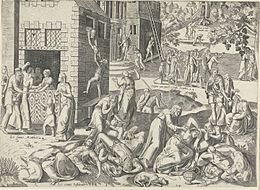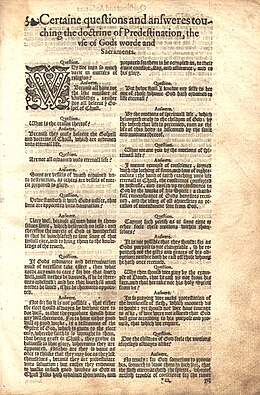
Back Predestinasie in Calvinisme Afrikaans التعيين المسبق في الكالفينية Arabic Duobla antaŭdestinismo Esperanto Doppia predestinazione Italian 칼뱅주의 이중예정론 Korean Predestinação no Calvinismo Portuguese Predestination (Calvinism) SIMPLE Dubbel predestination Swedish முன்குறித்தல் (கிறித்தவம்) Tamil 喀爾文主義預定論 Chinese
| Part of a series on |
| Reformed Christianity |
|---|
 |
|
|

Predestination is a doctrine in Calvinism dealing with the question of the control that God exercises over the world. In the words of the Westminster Confession of Faith, God "freely and unchangeably ordained whatsoever comes to pass."[2][3] The second use of the word "predestination" applies this to salvation, and refers to the belief that God appointed the eternal destiny of some to salvation by grace, while leaving the remainder to receive eternal damnation for all their sins, even their original sin. The former is called "unconditional election", and the latter "reprobation". In Calvinism, some people are predestined and effectually called in due time (regenerated/born again) to faith by God, all others are reprobated.
Calvinism places more emphasis on election compared to other branches of Christianity.[4]

- ^ Veldman, Ilja M. (1999). "Protestantism and the Arts: Sixteenth- and Seventeenth-Century Netherlands". In Finney, Paul Corby (ed.). Seeing Beyond the Word: Visual Arts and the Calvinist Tradition. Grand Rapids: Wm. B. Eerdmans Publishing. p. 404. ISBN 0-8028-3860-X.
- ^ "Westminster Assembly and Confession of Faith". Encyclopedia of Christianity Online. Chapter III.1 'Of God's Eternal Decree'. doi:10.1163/2211-2685_eco_w.12.
- ^ Macpherson, John (2008). The Westminster confession of faith. Kessinger Pub. Chapter III.1 'Of God's Eternal Decree'. ISBN 978-1-104-40849-7. OCLC 707096039.
- ^ Cite error: The named reference
Cambridgewas invoked but never defined (see the help page).
© MMXXIII Rich X Search. We shall prevail. All rights reserved. Rich X Search